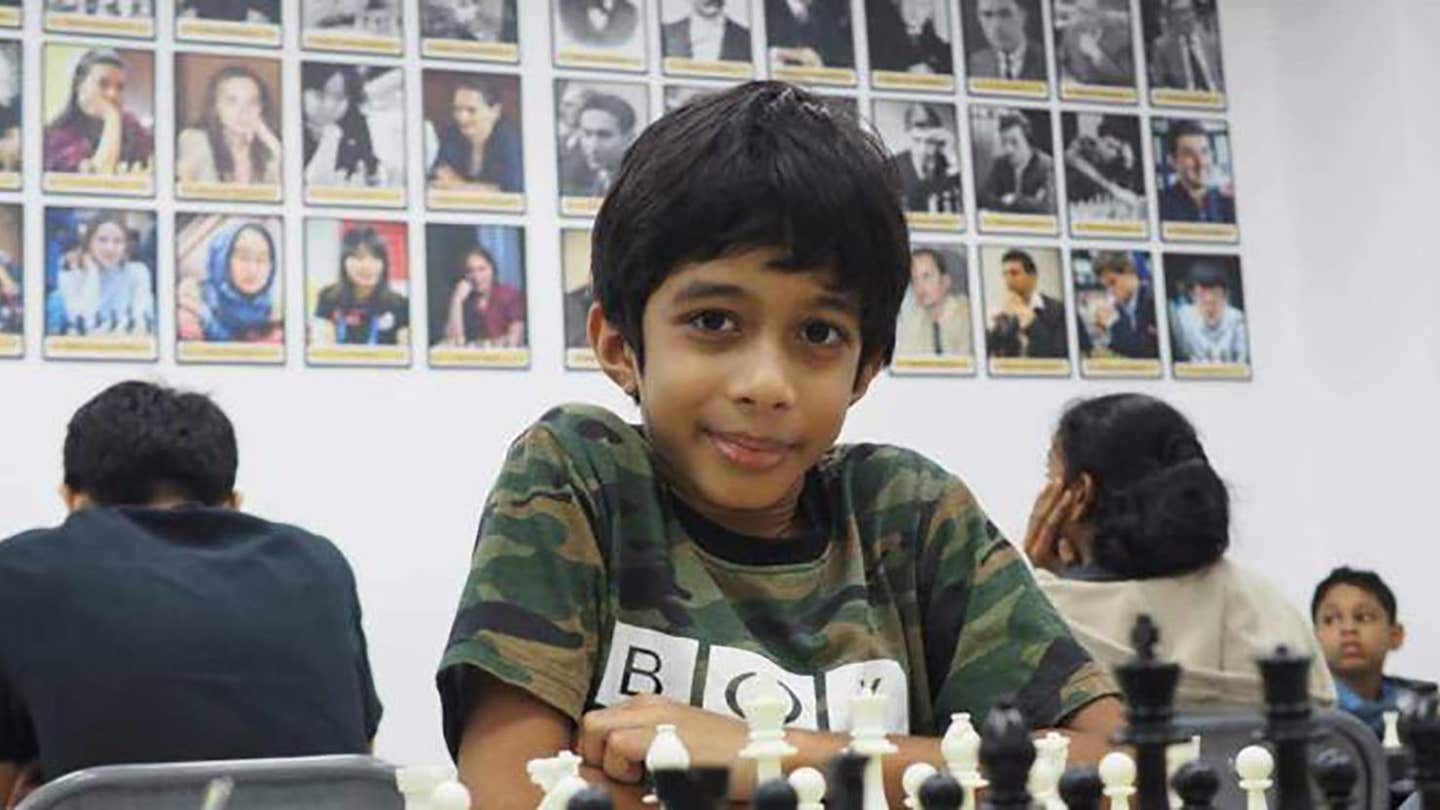Eight-year-old prodigy becomes youngest chess player to beat grandmaster
Surpassing the previous record set by eight-year-old Leonid Ivanovic, Ashwath became the youngest player ever to conquer a grandmaster

Ashwath Kaushik became the youngest player to beat a chess grandmaster during a classical tournament. (CREDIT: Carleton Lim/Singapore Chess Federation)
Ashwath Kaushik, an eight-year-old chess sensation, recently made headlines by defeating 37-year-old grandmaster Jacek Stopa during the Burgdorfer Stadthaus Open in Switzerland.
Surpassing the previous record set by eight-year-old Leonid Ivanovic, Ashwath became the youngest player ever to conquer a grandmaster in a classical game, accomplishing this feat at a mere age of eight years and five months.
Reflecting on his historic win, Ashwath expressed his elation, stating, "I've seen all the news about me beating a grandmaster and it feels amazing." He added, "I feel proud of my game and how I played. I felt amazing, just unbelievable."
Ashwath's journey into the world of chess commenced at the age of four when his parents introduced him to ChessKid.com, an online platform aimed at teaching children the intricacies of the game. This introduction marked the beginning of his fascination with chess, a game he described as "really fun."
Related Stories
As Ashwath's skills burgeoned, he swiftly began surpassing his family members in matches, showcasing a natural talent that he attributes to regular practice. His mother, Rohini Ramachandran, credits the Covid-19 pandemic for accelerating his chess development, noting the ample time Ashwath spent indoors during lockdowns.
With dedication and guidance from a coach, Ashwath dedicates up to eight hours a day to practicing chess on weekends while balancing his schoolwork during weekdays. Regarding his remarkable proficiency, Ashwath modestly remarked, "I practice a lot each day."
Despite his young age, Ashwath harbors lofty ambitions, aiming to become a world champion in chess someday. He acknowledges the journey ahead, acknowledging that such an achievement will require time and persistence.
Ashwath says he's not nervous when playing against much older opponents. (CREDIT: Carleton Lim/Singapore Chess Federation)
Ashwath's passion for chess shines through his eloquent discussions about the game, demonstrating a remarkable lack of nervousness when competing against opponents decades older than him. Despite his extraordinary talent in chess, Ashwath remains a typical eight-year-old in many aspects, enjoying activities such as playing with Lego, going on bike rides, and spending time with friends who support his budding chess career.
With his parents' support, Ashwath shares his chess games and puzzles online, even setting up a YouTube channel to showcase his skills. His enthusiasm for the game has also inspired his four-year-old brother, who eagerly watches Ashwath practice.
At just 8 years and 6 months old, Ashwath Kaushik became the youngest player ever to defeat a grandmaster in classical chess. (CREDIT: Chess.com)
Reflecting on their children's unexpected interest in chess, Ashwath's parents describe the experience as "surreal" but express immense pride in their son's achievements. Ramachandran remarked, "We are so, so proud of him. We've seen how much effort he puts in. He's passionate about the sport, and we are ready to support him for as long as he wants."
Following his record-breaking performance in Switzerland, Ashwath is taking a well-deserved break before diving back into the competitive chess scene. With his sights set on becoming the next big name in the sport, Ashwath continues to pursue his dreams with unwavering determination and the unwavering support of his family.
Lucas's journey to recovery began at the age of six when he was enrolled in a clinical trial testing a chemotherapy drug called everolimus, usually employed in treating kidney, pancreas, breast, and brain cancers, but not previously used successfully against DIPG.
Responding positively to the treatment, Lucas witnessed a gradual disappearance of the tumor.
Related Stories
Seven years later, he stands cancer-free, having been officially in remission for five years. Dr. Jacques Grill, Lucas's physician at the Gustave Roussy cancer center in Paris, expressed astonishment at Lucas's success, stating, "Lucas 'beat all the odds'... his case offers real hope."
Lucas's parents, Cedric and Olesja, took him to France to participate in the BIOMEDE trial, which aimed to test new drugs for DIPG.
Everolimus functions by inhibiting mTOR, a protein crucial for cancer cell growth and division, as well as the formation of new blood vessels. This mechanism impedes cancer growth by halting cell reproduction and reducing blood supply to tumor cells.
Lucas, aged eight, with his mother. His parents took him to France to join a clinical trial. (CREDIT: lesja Jemeljanova / Facebook)
Initially, doctors hesitated to discontinue Lucas's treatment, fearing a potential relapse. However, a year and a half ago, it was discovered that Lucas had already ceased taking the medication, yet the tumor remained absent. Dr. Grill recounted, "Over a series of MRI scans, I watched as the tumor completely disappeared."
The medical community remains intrigued by Lucas's exceptional recovery, with Dr. Grill suggesting that his tumor's rare mutation may have rendered it highly susceptible to the drug. While seven other children in the trial showed prolonged responses to treatment, Lucas's case stands out as his tumor vanished entirely.
Iesja and Lucas promoting Childhod Cancer Awareness Month. (CREDIT: lesja Jemeljanova / Facebook)
DIPG, affecting approximately 300 children annually according to the Dana-Farber Cancer Institute, primarily strikes children aged five to nine. Only 10% of people diagnosed with this disease live for more than two years.
This type of tumor emerges at the base of the brain and the top of the spine, with its exact cause still unknown. The tumor exerts pressure on the pons, a critical brain region governing essential bodily functions such as breathing and blood pressure regulation.
Lucas, with his parents, Cédric and Olesja, and sister, Tatiana. (CREDIT: lesja Jemeljanova / Facebook)
Symptoms of DIPG typically include impaired eye movement, facial weakness, walking difficulties, abnormal limb movements, and balance problems. Lucas's diagnosis occurred at the age of six after experiencing symptoms like difficulty walking, urinary issues, fainting spells, and nosebleeds.
Researchers are now focused on understanding the genetic peculiarities underlying Lucas's remarkable response to treatment. By analyzing patients' tumor genetic profiles and creating tumor "organoids" – artificially grown cell masses resembling organs – they aim to replicate the genetic variations observed in Lucas's cells.
Marie-Anne Debily, overseeing the laboratory efforts, emphasized the importance of identifying drugs capable of replicating the effect seen in Lucas's tumor cells.
However, the road to translating these findings into effective treatments is lengthy and arduous, as Dr. Grill pointed out. "On average, it takes 10-15 years from the first lead to become a drug – it's a long and drawn-out process," he explained.
Despite the challenges ahead, Lucas's case represents a beacon of hope in the fight against DIPG, inspiring researchers to unravel the mysteries of this devastating disease and develop innovative therapies to save young lives.
Note: Materials provided above by The Brighter Side of News. Content may be edited for style and length.
Like these kind of feel good stories? Get the Brighter Side of News' newsletter.
Joshua Shavit
Science & Technology Writer | AI and Robotics Reporter
Joshua Shavit is a Los Angeles-based science and technology writer with a passion for exploring the breakthroughs shaping the future. As a contributor to The Brighter Side of News, he focuses on positive and transformative advancements in AI, technology, physics, engineering, robotics and space science. Joshua is currently working towards a Bachelor of Science in Business Administration at the University of California, Berkeley. He combines his academic background with a talent for storytelling, making complex scientific discoveries engaging and accessible. His work highlights the innovators behind the ideas, bringing readers closer to the people driving progress.



